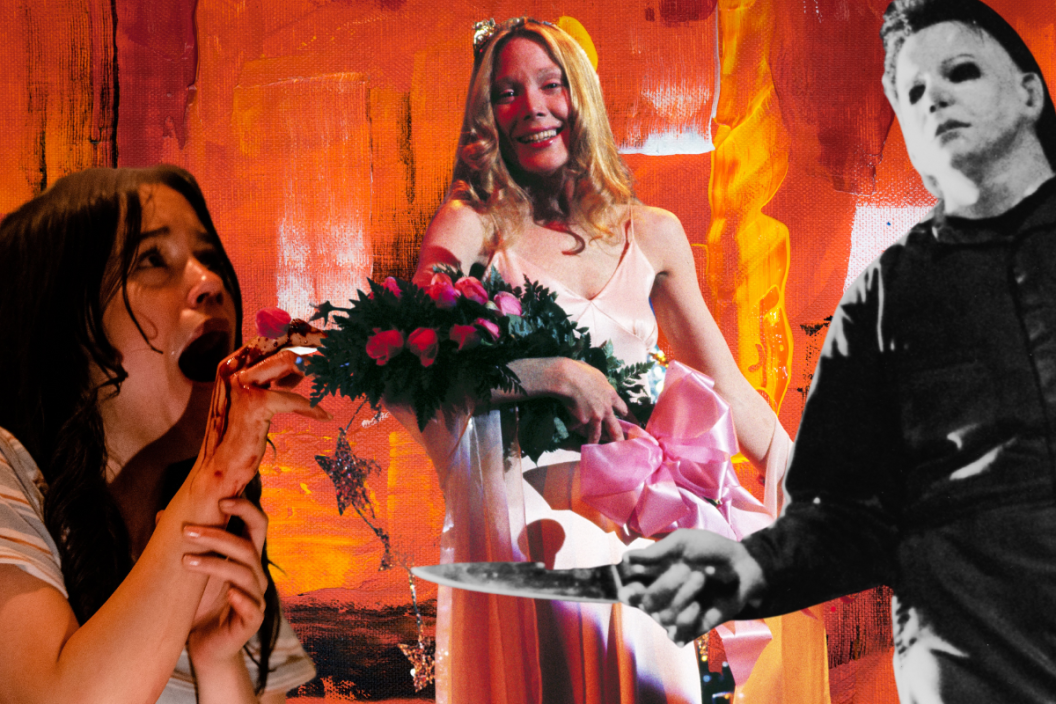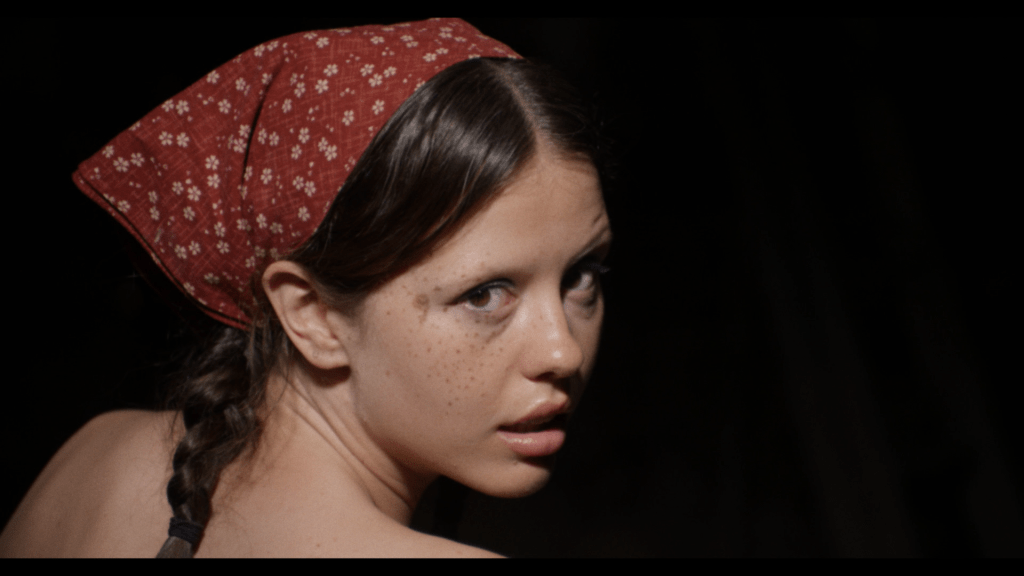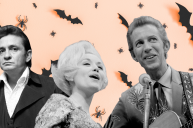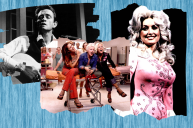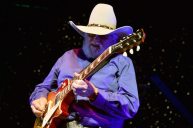One of the biggest musical treats of the year comes with Loretta Lynn's version of "Act Naturally" poppin' up in the slasher film, X. Directed by Ti West, the film follows a group of ambitious porn filmmakers who head out to rural Texas to bring their vision of "The Farmer's Daughter" to life. The 1963 performance appears in an inconsequential moment, as the camera pans behind the heels of the film's central character Maxine (Mia Goth), but it gives her character a depth and understanding.
Videos by Wide Open Country
You see, Maxine has big dreams of becoming the next superstar, and she'll do anything to step into the spotlight. "They're gonna put me in the movies / They're gonna make a big star out of me," howls Lynn. It's a stunning contrast to the scene?that of a rustic, rundown cabin on the edge of a nearby pond. If it wasn't clear to the audience, the lyrics drive to the heart of the film's central thesis about fame, desperation and the price that must be paid in Hollywood.
Much like in X, country music is a mood setter. Historically, country in horror does one of three things: impresses upon the listener the aw-shucks rural spirit uncontaminated by the city, hints at something sinister bubbling beneath the surface, or clues the audience into a deeper character context. There's always a rhyme and a reason for a country song's inclusion, frequently driving the plot or character moments.
Wide Open Country took a gander at a slew of classic and popular horror movies, digging up songs used either in the film or on the soundtrack. Compiled together, here is an introductory crash course in horror movies that use country songs in some way, from Loretta Lynn to Orville Peck and Charley Crockett.
Pre-1960s
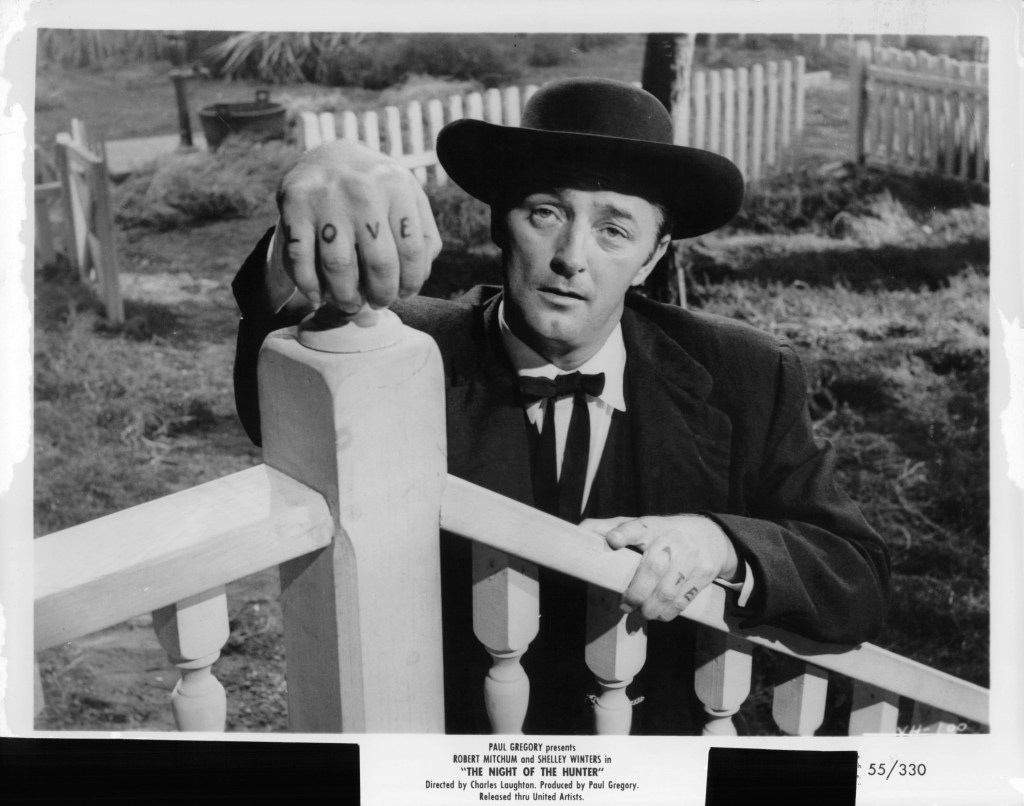
Robert Mitchum rests his tatooed hands on porch railing in a scene from the film 'The Night Of The Hunter', 1955. (Photo by United Artists/Getty Images)
Country music and gospel go hand-in-hand. 1955's The Night of the Hunter is one of the earliest instances in which country or gospel music was used in a horror film to drive home the plot. "Leaning on the Everlasting Arms," a hymn composed in 1887, is sung by the film's antagonist Reverend Harry Powell (Robert Mitchum). The performance gives the film both a wistful and unsettling feeling.
The film also features another hymnal, "Bringing in the Sheaves," written in 1874. Later, the character Uncle Birdie (James Gleason) strums his banjo and sings a blues-tinged lamentation about his life. In yet another scene, two children perform "Once Upon a Time There was a Pretty Fly," a haunting children's folk tune.
Other early films that utilize folk songs and hymn/gospel melodies include Cat People ("May Heaven Be with You" and "Dodo, L'Enfant Do," a French folk lullaby), The Seventh Victim ("May Heaven Be with You"), The Curse of the Cat People ("Reuben Ranzo," a traditional sea shanty), Mystery of the Wax Museum ("The Prisoner's Song," originally written by Guy Massey and famously recorded by Vernon Dalhart), and The Thing from Another World ("Bury Me Not on the Lone Prairie," a traditional western song, recorded by Tex Ritter and many others).
1960s
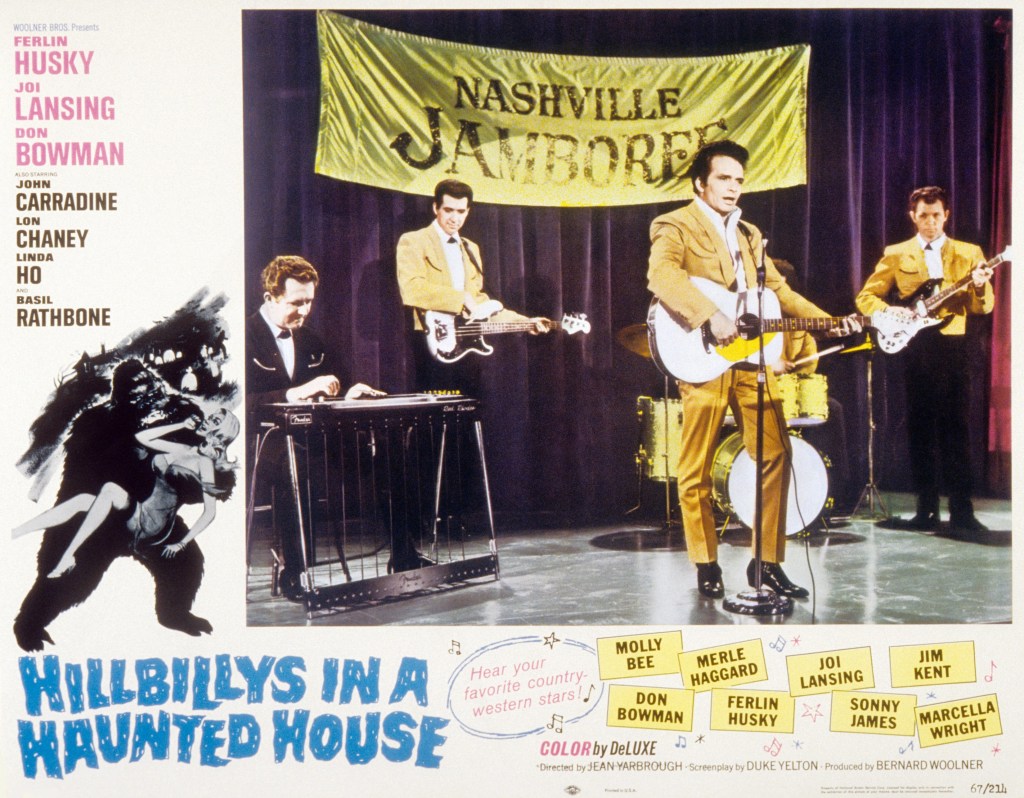
Hillbillys In A Haunted House, poster, Merle Haggard, 1967. (Photo by LMPC via Getty Images)
With the emergence of outlaw country, the '60s saw big names like Merle Haggard and Johnny Cash appear in numerous horror and thriller movies. Most notably, Cash wrote "Five Minutes to Live" as the theme to 1961's crime/thriller of the same name, in which he also co-starred alongside Ron Howard, Cay Forrester and Pamela Mason. The film, directed by Bill Karn, follows two criminals and their escapade to extort money.
In 1967's RiffTrax: Hillbillys in a Haunted House, numerous musical performances from country stars are peppered throughout the film. Those include Haggard's "Someone Told My Story" and Jim Kent's "Tell Me Shoes." The story centers around a promising country music star named Woody Wetherby (Ferlin Husky) on his way to Nashville to perform in a jamboree, which also features artists Molly Bee ("Heartbreak USA"), Haggard ("Swinging Doors"), and Marcella Wright ("Now We're Strangers"). The film serves as a sequel to 1966's comedy The Las Vegas Hillbillys.
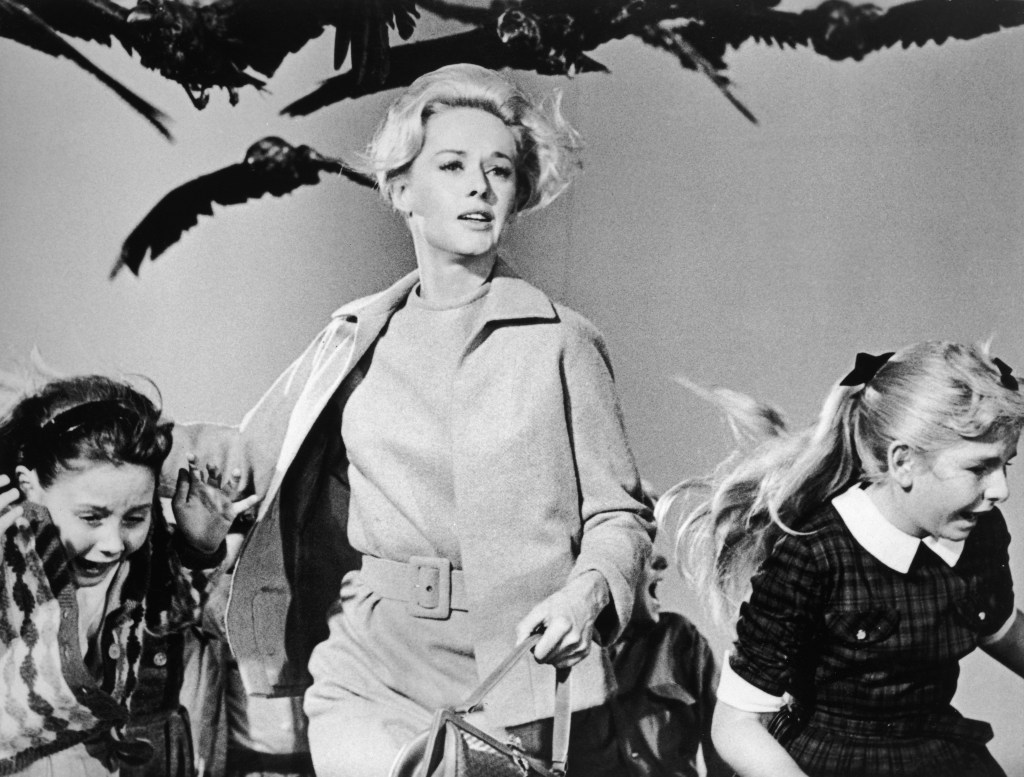
1963, American actor Tippi Hedren and a group of children run away from the attacking crows in a still from the film 'The Birds' directed by Alfred Hitchcock. (Photo by Universal Studios/Getty Images)
"Rissle-dy, Rossle-dy," lifted from a Scottish folk song called "The Wee Cooper o'Fife," is featured in a scene from Hitchock's The Birds, as well as a children's lullaby included in Rosemary's Baby. Johnny Cash once issued a live recording of "Drink to Me Only with Thine Eyes," a traditional tune also performed in 1960's The Little Shop of Horrors.
The '70s
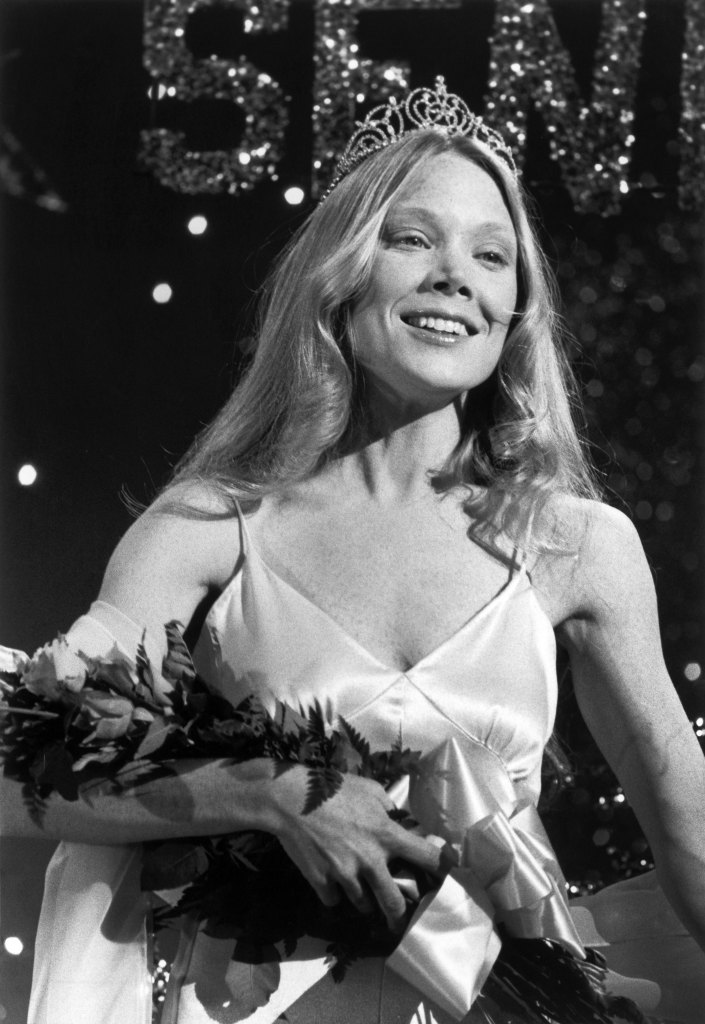
Sissy Spacek attends her high school prom in the Brian De Palma horror classic "Carrie" based on the Stephen King novel in 1976 in Los Angeles, California. (Photo by Michael Ochs Archives/Getty Images)
Early in 1972's Deliverance, a character named Drew (Ronny Cox) picks his guitar and gets into a musical battle with a young boy picking his banjo. The instrumental, "Dueling Banjos," originally composed by Arthur "Guitar Boogie" Smith in 1954, brings a lightness to the film before the story goes awry. The scene is presented as a call and response, making the dynamic between characters all the richer. Unsurprisingly, the song was issued as a single (credited only to performer Eric Weissberg) and became a smash hit, climbing to No. 5 on Hot Country Songs and No. 2 on the Hot 100.
Fiddle and bluegrass music continues to play a big part in the film's tone. While paddling down the river soon after, music is used to set the scene. Later that night, Drew whips out his guitar again and plays Irish folk group The Clancy Brothers' "The Moonshiner" around the campfire.
That same year, Wes Craven's exploitation film The Last House on the Left features several David Hess songs ("Now You're All Alone," "Wait for Rain"). Hess, who co-wrote songs recorded by Elvis Presley and Bat Boone, composed the film score and wrote numerous folk-influenced instrumentals, including "Daddy, Put Your Coat of Many Colors On" and "Water Music." The ethereal quality of the music stands in stark contrast to the rape-revenge storyline, giving the images a striking sharpness.
The Texas Chainsaw Massacre (1974) uses country music in a similar fashion. When a group of young people travel across rural Texas, they pull into a gas station to refill their van. Several country songs play on both the radio and over the speakers of the adjoining barbecue stand. Those songs include "Fool for a Blonde" by Roger Bartlett & Friends, "Waco" and "Glad Hand" by Timberline Rose, and "Daddy's Sick Again" by Arkey Blue.
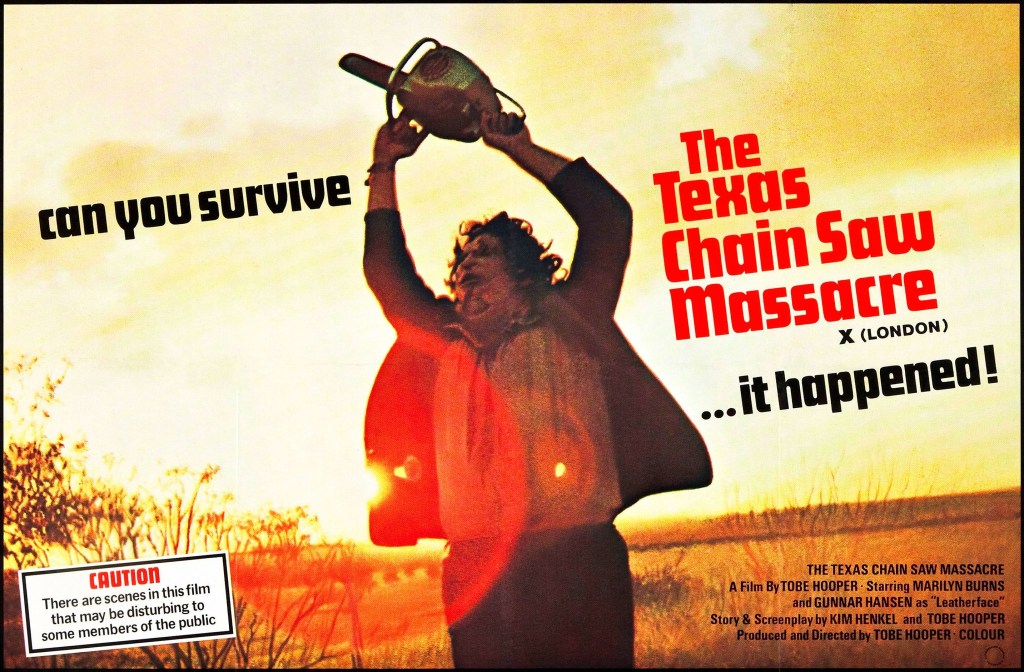
Photo by LMPC via Getty Images
Throughout the '70s, many more country songs and hymnals found their way into horror movies. Johnny Cash starred in A Gunfight, for which he wrote "A Gunfight," alongside Kirk Douglas, Karen Black, and Jane Alexander. Cash's "Don't Take Your Guns to Town" appeared in Herowork (1977). In 1979's The Amityville Horror, the character Kathy sings the traditional hymn "Jesus Loves Me" before seeing a ghost that was once murdered in the home.
Other songs appearing in classic films include "There is Power in the Blood" (Carrie), "Ramblin' Man" by the Allman Brothers Band (The Exorcist), "Willows Song," "Gently Johnny," and "The Landlord's Daughter" by Paul Giovanni (The Wicker Man), "I Honestly Love You" by Lynn Anderson and "Show Me the Way to Go Home" (Jaws), and "Amazing Grace" (Invasion of the Body Snatchers).
The '80s
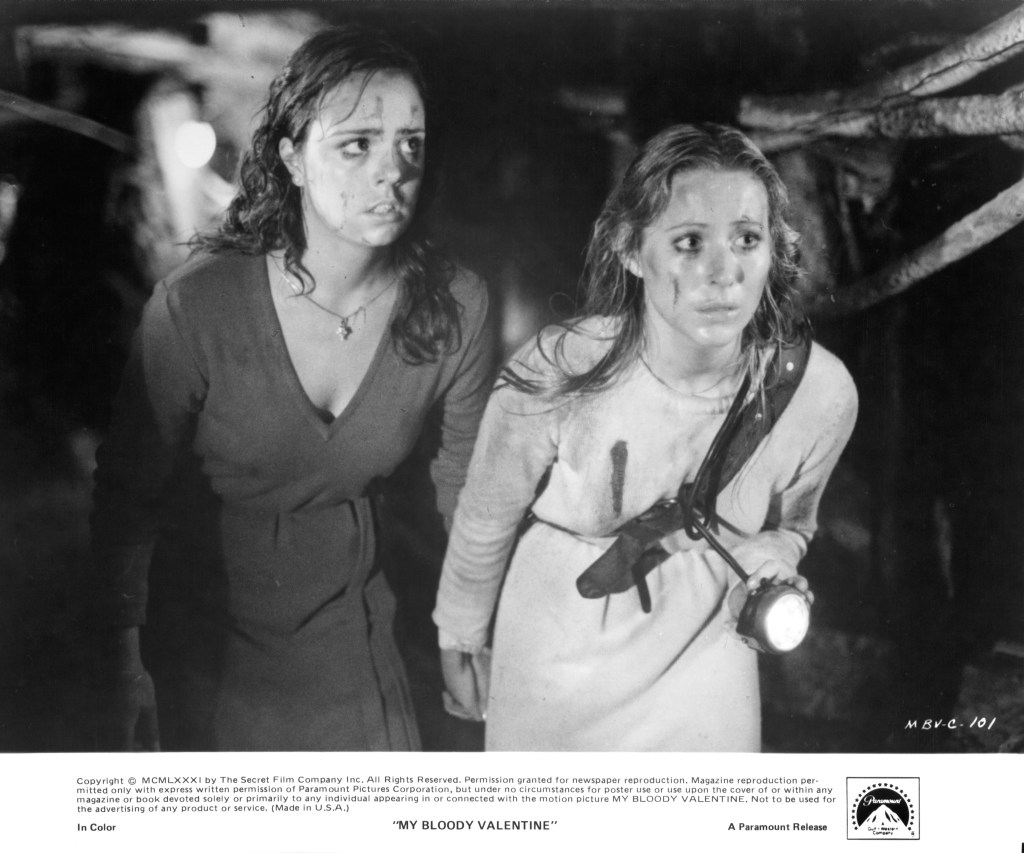
Actresses Lori Hallier and Cynthia Dale on the set of Paramount Pictures movie "My Bloody Valentine" in 1981. (Photo by Michael Ochs Archives/Getty Images)
In the opening scene of Friday the 13th (1980), a camp counselor plays a guitar and sings "Michael (Row Your Boat Ashore)," a spiritual song recorded by folk group The Highwaymen in 1960. Its angelic tone contrasts the very next scene, in which he hooks up with another counselor and is eventually killed by an unseen murderer.
A year later, My Bloody Valentine (1981) uses banjo music during a car chase and later several country songs during the Valentine's Day dance. The majority of the soundtrack was helmed by Paul Zaza and Canadian country singer Marie Bottrell, who enjoyed a few hit singles on the charts and earned several Female Vocalist of the Year nominations. The end credits tune, "The Ballad of Harry Warden" by John McDermott, was written specifically for the film with the belief it would become a smash hit. But it didn't quite take off as expected.
American Werewolf in London prominently features folk/rock group Creedence Clearwater Revival's 1969 hit "Bad Moon Rising" during a scene in which David (David Naughton) staves off transforming into a werewolf.
Several other country and gospel songs found their way into horror films in the '80s, including Dwight Yoakam's "Guitars, Cadillacs, etc." (Terminator 2: Judgment Day), Keith Whitley's "You Don't Have to Move That Mountain" as performed by Hot Rize (The Blob), "Runaway" by Bonnie Raitt (Christine), and Robert Lowry's "Shall We Gather at the River" (Halloween 4: The Return of Michael Myers).
The '90s
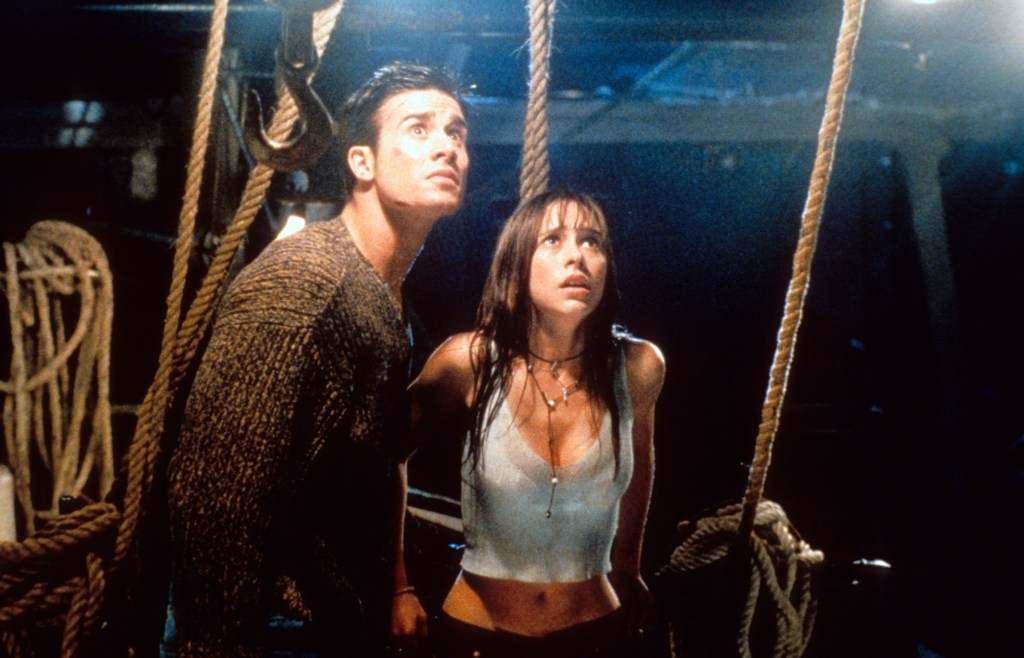
Freddie Prinze Jr and Jennifer Love Hewitt looking up in fear in a scene from the film 'I Still Know What You Did Last Summer', 1998. (Photo by Columbia Pictures/Getty Images)
"I've been a prisoner of my love for you for a very long time," laments Tiffany Valentine (Jennifer Tilly) to her dolly beau Chucky (Brad Dourif). In this particular Bride of Chucky scene, Tiffany locks Chucky inside a wooden playpen and expresses her anxieties over unrequited love. She promptly turns on the radio, which is playing Willie Nelson's "Crazy," as performed by the Kidney Thieves. It expresses everything she's been longing to say after 10 years searching for her lover inside a doll.
Nelson songs were a staple in the '90s. Those include "Someone to Watch Over Me" (Jennifer 8), "Stardust" (Flesh and Bone), and "Don't Fence Me In" (The Tie That Binds) Similarly, Tammy Wynnette's "Stand By Your Man" found its way onto soundtracks for The Crying Game and horror/comedy So I Married an Axe Murderer. "Near You," a duet with George Jones, Faith Hill's "This Kiss," and Sheryl Crow and Stevie Nicks' "If You Ever Did Believe" and "Crystal" were featured in 1998's Practical Magic.
The decade also included Kris Kristofferon's "For the Good Times" in 1992's The Fear Inside and Steve Earle's "All My Life" in the 1998 Psycho remake, starring Vince Vaughn and Anne Heche.
In I Know What You Did Last Summer, country music is used in a scene in which Southern Culture on the Skids play the song "My Baby's Got the Strangest Ways."
Jimmy Buffett's "Don't Bug Me" also appeared in Arachnophobia and The Mavericks' "Foolish Heart" in 1996's From Dusk Till Dawn starring George Clooney.
It should also be noted that country superstar Reba McEntire plays in a prominent role as doomsday preparer Heather Gummer in 1990's creature feature Tremors, alongside Kevin Bacon (as Valentine) and Fred Ward (Earl).
The '00s
The aughts was a banner decade for country music in horror. And it began with James Wong's Final Destination, released in 2000. The plot focuses on a group of teens who survive a plane crash and are stalked and killed by death itself. On a script co-written with Glen Morgan and Jeffrey Reddick, the film uses John Denver's 1972 hit "Rocky Mountain High," an ode to Colorado, that becomes as crucial to the story as the characters. Denver "died in a plane crash," realizes Devon Sawa's character Alex. The juxtaposition between a song that's full of yearning and a storyline so grim and dark gives the film even greater weight.
Rockstar-turned-filmmaker Rob Zombie has a fondness for country, frequently using country classics in his grimy grindhouse-style films. With his 2003 feature House of 1000 Corpses, Zombie included songs by Buck Owens ("Who's Gonna Mow Your Grass?"), and Jesse Dayton and Lew Temple (an album recorded as fictional characters Banjo & Sullivan from the film). Dayton's work is also included in Zombie's 2009 film Halloween II, and he appears in the fictional musical group Captain Clegg & the Night Creatures. The Halloween II soundtrack contains Lynyrd Skynyrd's "What's Your Name," as well.
2005's The Devil's Rejects soundtrack boasts a slew of big names in country and blues music, including Kitty Wells ("It Wasn't God Who Made Honky Tonk Angels"), The Allman Brothers Band ("Midnight Rider"), Terry Reid ("Brave Awakening," "To Be Treated," "Seed of Memory"), Elvin Bishop ("Fooled Around and Fell in Love"), Otis Rush ("I Can't Quit You Baby"), Lynyrd Skynyrd ("Free Bird"), and Buck Owens ("Satan's Got to Get Along").
That is just scratching the surface. Kitty Wells' "It Wasn't God Who Made Honky Tonk Angels" is also featured in Wicked Lake, whereas "Mama Tried" by Merle Haggard is used to eerie effect in home invasion film The Strangers. Then, there's Hank Williams' "I'm So Lonesome I Could Cry" in Zombieland (2009), Lynyrd Skynyrd's anthem "Sweet Home Alabama" playing on the radio in The Texas Chainsaw Massacre remake (2003), Webb Pierce's "More and More" in The Hills Have Eyes (2006) and a band performance in sci-fi horror flick Slither (2006).
Johnny Cash's name can be found all over the place. Two songs, "Guess Things Happen That Way" and "(There'll Be) Peace" feature in 2000's Mothman. "The Man Comes Around" is used in both 2004's Dawn of the Dead and The Hunted (2003), which also contains "Highway 61 Revisited," a Bob Dylan original. Other Cash songs include "A Satisfied Mind" (Kill Bill, Vol. 2) and "Ring of Fire" (Silent Hill).
The 2010s
The 2010s saw a dip in country music found in horror movies. Johnny Cash once again makes an appearance with his version of "We'll Meet Again" in 2010's The Crazies remake. His "The Man Comes Around" worms its way into another film, 2012's thriller/crime/drama Killing Them Softly starring Brad Pitt.
Throughout the next few years, numerous other country songs were selected for film features and soundtrack placements, including Neko Case's "Furnace Room Lullaby (The Gift), John R. Butler's "The Hand of the Almighty (Texas Chainsaw 3D), "We Buried Her Beneath the Willows" by Kitty Wells (31), classic hymn "You Are My Sunshine" (Annabelle: Creation), "Sinister Purpose" by Creedence Clearwater Revival (Green Room), and Dwight Yoakam's "I Sang Dixie" (Above Suspicion).
Kentucky troubadour Sturgill Simpson penned the title theme for writer/director Jim Jarmusch's The Dead Don't Die, a horror/comedy about zombies and the end of the world. That same year, "I Saw the Light" by Hank Williams was included in religious barn-burner Saint Maud. Additionally, 2019's Zombieland: Double Tap featured classic patriot anthem "America the Beautiful," Lynyrd Skynyrd's "Free Bird," and "I'm Alright" by Kenny Loggins, and the hymnal "Nearer My God to Thee" was used in The Lodge.
The '20s So Far
It's only been three years into the new decade, and country music has taken a prominent role in many of the genre's biggest releases. The first notable moment involves Sturgill Simpson's role in the politically razor-sharp survivalist thriller The Hunt, in which Simpson stars as a typical blue collar American. Musically speaking, songs by Bobbie Gentry ("Mississippi Delta") and Dusty Springfield ("Girls It Ain't Easy") are worked into the soundtrack.
With The Devil All the Time, starring Tom Holland and Bill Skarsgard, a smorgasbord of country songs are used in the film and the soundtrack: Pokey LaFarge's "Banks of the Ohio" and "Stealin' Stealin'," The Delmore Brothers' "Hillbilly Boogie," The Browns' "The Three Bells," Jimmie Rodgers' "Honeycomb," Skeeter Davis' "He Says the Same Things to Me," "Welcome to My World" by Jim Reeves," "Funny How Time Slips Away" by Billy Walker, Ferlin Husky's "Wings of a Dove," Jan Howard and Wynn Stewart's "Wishful Thinking," Willie Nelson's "Funny How Time Slips Away," and Dolly Parton's "Put It Off Until Tomorrow."
In Mike P. Nelson's Wrong Turn, Woody Guthrie's "This Land is Your Land," as performed by Ruby Modine, is used to creepy effect over the end credit sequence, giving the entire film a more haunting quality. The same can be said for the use of Amy Grant and Anne Murray's 1981 hit "Could I Have This Dance" in Halloween Kills, as it plays over a gruesome death scene to add a wicked poignancy. Released late 2020, Possessor features a song from Orville Peck ("Dead of Night"), whose "Turn to Hate" is included in 2022's Scream.
Throughout 2021, countless more country songs were found in popular horror films ? Willie Nelson's standard "On the Road Again" in Ghostbuster: Afterlife; Loretta Lynn's "Hello Darling" in Paranormal Activity: Next of Kin and "Coal Miner's Daughter" in The New Mutants; Charley Crockett's "Welcome to Hard Times" and Freddy Fender's "Before the Next Teardrop Falls" in The Forever Purge; "San Quentin" by Johnny Cash in Venom; and Flatt & Scruggs' "Hot Corn, Cold Corn" (live) in There's Someone Inside Your House.
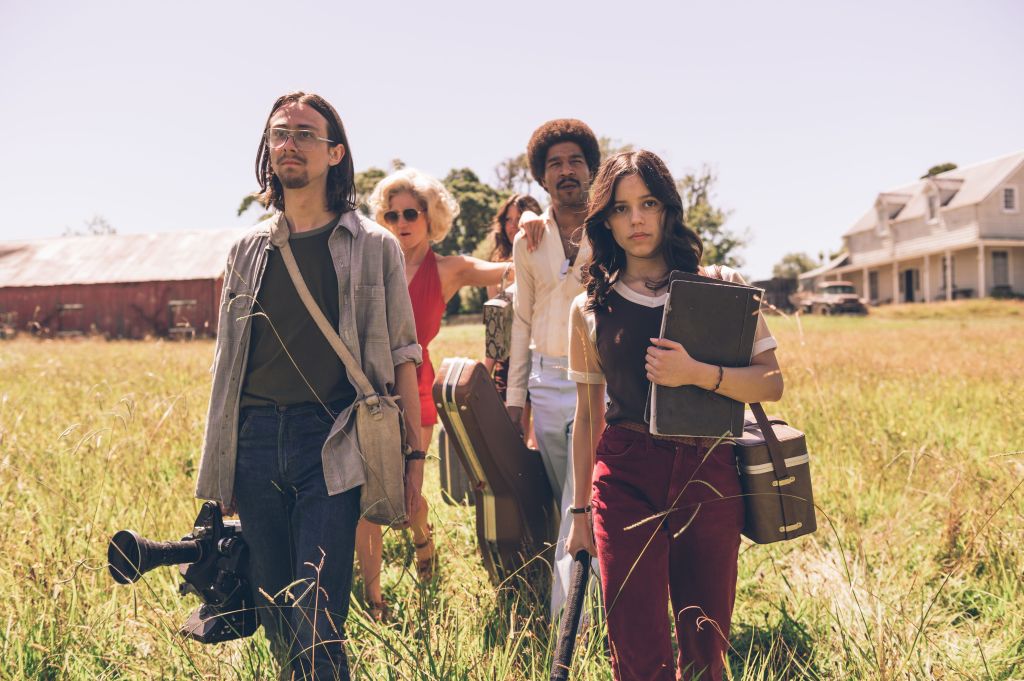
Courtesy of A24
The country train has continued in 2022. In February, Netflix's Texas Chainsaw Massacre featured songs by Charley Crockett ("The Valley" and "The Man That Time Forgot") and Shakey Graves ("Pay the Road"). Acclaimed filmmaker Ti West made his grand return to horror with this much-lauded throwback slasher X, in which Loretta Lynn's version of "Act Naturally" (a Buck Owens original) plays over a scene with the central character, Maxine (Mia Goth). Moments later, Brittany Snow's character Bobby-Lynn sings "Landslide" by Fleetwood Mac as Jackson (Kid Cudi) strums an acoustic guitar. The images on screen cut between the youthful glow of the core cast and the film's antagonists, the elderly couple Pearl (Goth) and Howard (Stephen Ure). It's as unsettling as it is remarkably moving.
Elsewhere, "To Know Him is to Love Him" by The Teddy Bears (also famously recorded by Dolly Parton, Linda Ronstadt, and Emmylou Harris) is featured in a pivotal character scene in Don't Worry Darling. In the '50s-drenched film, Alice (Florence Pugh) grows bored with her housework and decides to take a ride on the trolley in town. She rides all the way to the end of the line, where she spies an airplane on fire that crashes in the distance. It's the first crack to appear in her love of her husband Jack (Harry Styles). And even more recently, George Jones' "White Lightning" is found in the Netflix-released Mr. Harrigan's Phone.
A long history of country music in horror leads into this year's biggest surprise, Brea Grant's completely country-centered Torn Hearts. By all accounts, it's the first film of its kind. The film follows Harper Dutch (Katey Sagal), a country veteran turned recluse, and two up-and-coming musicians Leigh (Alexxis Lemire) and Jordan (Abby Quinn), known together as Torn Hearts. Once tracking down Harper to her secluded estate, the duo are put through the wringer and their loyalty to one another tested until somebody snaps. Music from Amythys Kiah ("Hangover Blues") makes its way into the film, as well as numerous cuts from the fictional band.
Even more recently, Tammy Wynette's "Stand By Your Man" plays a pivotal emotional thread in the Netflix-released Mr. Harrigan's Phone. When Craig (Jaeden Martell) comes to read to elderly gentlemen Mr. Harrigan (Donald Sutherland), the two bond over literature and philosophy. Craig gifts Harrigan an iPhone, teaching him the ways of a technologically-advanced world, and sets a specific ringer for Craig, one of Harrigagan's favorite songs: the Wynette classic. Once Harrigan dies, Craig's own phone begins to ring with the country song frequently playing throughout the film. It teases that something supernatural is at play, driving home the themes of death and grieving the script so wisely and profoundly explores. George Jones' "White Lightning" also appears in the film.
Check out our roundup of some of the best country songs in horror films below.
READ MORE: 10 Classic Country Songs That Will Creep You Out
